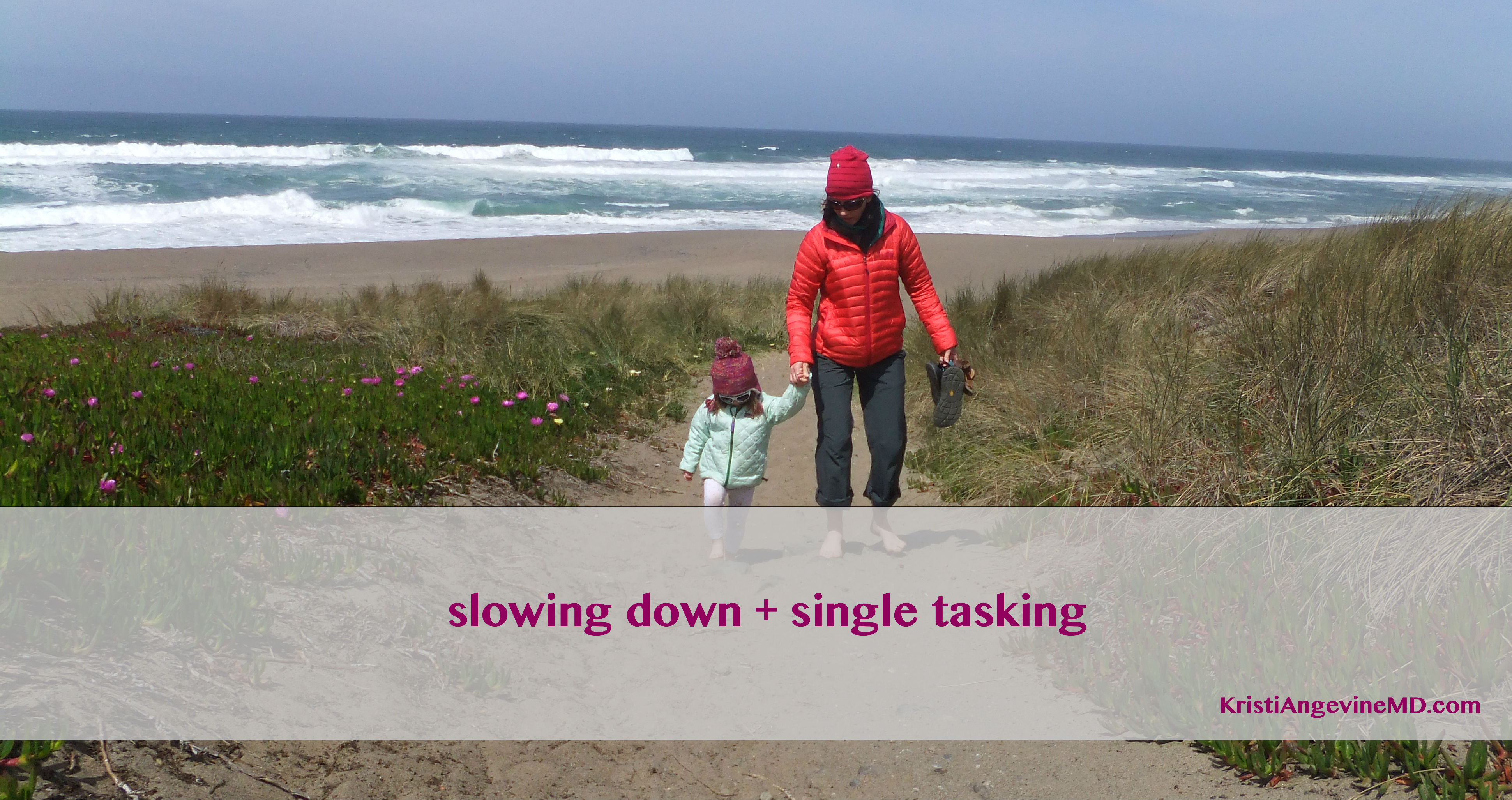
by Kristi | Jul 24, 2015 | Life + Work, Medicine |
This blog is personal. It’s part Ob/Gyn, part wellness in daily living, and part my own reflections on being a doctor and a mom. This is a glimpse into the personal side. Recently, I hit a wall. Too busy at work. Too busy at home. Not enough time spent doing the things that matter most. Even though it’s so obvious to me in hindsight, it took me a while to realize that I needed to pare down my to do list and slow my pace. And in this process, I ended up taking a much longer than intended break from writing posts and emailing my community. I shared this with my subscribers in an email and here’s what I wrote: The last three months have been a heightened level of busy for me. Looking back on all the go-go-go-busy-bee-ness makes my shoulders tense and my brow crinkle. Work life: Lots of babies born and lots of patients in the office. Home life: Maintenance projects. Air conditioning dying. (Yes, my family and I are first world, pansies. Here in the southeast, it was hot, humid and we love our artificially cooled air.) My perception of feeling overly busy is not unique. Lots of people are overextended. Worn out from multi-tasking. It’s the new norm. Hustle to do it all, have it all, advance careers, make more money, be super-parents to super-kids, stay in shape, run a tidy house, keep in touch with friends, and be good daughters, wives, girlfriends, colleagues. This high-octane, do-it-all, have-it-all approach is a recipe for burnout. Why? It’s not realistic or sustainable. It’s such a common phenomenon, that...

by Kristi | Apr 17, 2015 | Uncategorized |
I really love how this article gives clear ideas for how to navigate the newborn period. It’s great because it doesn’t go overboard with excess information. That just ends up overwhelming new parents-to-be. It just gives ways to make life with a new baby a little easier. These are tips I really wish I would have implemented with my sweetie pie. The founders of NuuNest, Cindy and Jana, put together this list based on their many years of experience working as nurses and lactation specialists with moms in the immediate postpartum period. Enjoy! -Kristi Your due date is arriving! You have everything you need, right? Diapers and wipes. Check. Sleepers, blankets and onesies. Check. Here are 11 things you may not have thought about yet! 1)Identify a helper or support person. Even if your partner plans to take time off after baby’s birth, it pays to have extra support. Someone to help with the housework, the cooking, the laundry. This could be a parent, your aunt or a trusted friend. You must feel comfortable with this person and not feel the need to “entertain” them. This person’s role will be to care for you. Having a support person will free you to focus on getting to know your baby and finding some much needed time to nap. Parents with other children often take turns napping; having a support person to help with siblings will mean both you and your partner can rest when the bay does (doubling your sleep time!). 2)Make a plan for visitors (and explain it to family and friends!) Too much company is...

by Kristi | Mar 1, 2015 | birth stories, Ob-Gyn, Pregnancy |
Here’s the premier post to this column about birth stories. It details the difficult C-section experience and recovery for a mom who is also a nurse. What follows is the story and then my direct reply to the author. All names of included people have been altered or omitted for privacy reasons. The story: When I responded to the c-section article you asked for my son’s story. It has taken me a while to get it together, but here it is. My husband and I tried for 4 years and had 3 losses. When we found out [this pregnancy] was viable we were over the moon. I had always had an idea of how I wanted delivery to go. I wanted an unmedicated delivery and immediate skin to skin. At 28 weeks I was diagnosed with gestational diabetes. I was very strict with my diet and exercise. I only gained 9 pounds during my pregnancy. At about 30 weeks both my primary OB and the MFM (maternal fetal medicine) doctors started telling me [my baby] was macrosomic. My primary OB started pushing me to do a lung maturity and deliver at 35 weeks. I was determined to keep him in until term. At my 38 week appointment my primary OB told me my baby weighed 4200g. She sat down in front of me and told me an induction would be dangerous. She told me it wasn’t safe for me to stay pregnant. “It would be a real shame if after all you have been through he had a dystocia (baby’s shoulder getting stuck at the time of vaginal...

by Kristi | Feb 18, 2015 | birth stories, Ob-Gyn, Pregnancy |
So, I hear lots of pregnancy and delivery stories. Lots. Some are beautiful. Some are fraught with disappointment. Some are heartbreaking. Some are so intensely inspiring. I’m starting a standing series on the blog where I feature a pregnancy/delivery/postpartum story from you. They will be shared anonymously and only with the explicit permission of the author. If there are any take home lessons or experiences that warrant commentary, I’ll add my two cents with the hope that hearing a little something extra will be helpful. If you would like to share your birth story, send it in to kristiangevineMD at gmail Thank you in advance! Kristi {Due to the volume of stories I currently receive, not every one will be able to be...

by Kristi | Feb 17, 2015 | Gynecology |
Hello everyone! Let’s talk about menopause and perimenopause symptoms, shall we? Have you read that book Our Bodies, Ourselves? Gosh, it’s an old one. It conjures up college years for me. It was first published in in the early 1970’s and re-issued in updated forms every 4-6 years. It’s a manual of sorts that discusses women’s bodies and the physical and emotional changes that occur as we age. I remember picking it up in my early 20’s and pouring over it. Every chapter talked about intimate topics in such a straightforward way. It felt like I’d found a treasure box of vital info that I’d never been privy to. It talked about vaginas, urethras, and clitorises (clitori??). It talked about sex. It talked about orgasm, menopause, pregnancy, breast feeding. It had PICTURES of everything. As a 20 something I was enthralled. It discussed all these topics that typically were discussed in health class that one time in middle school, (when most of us were too self conscious to really listen). It shared them with grace and ease. That book normalized talking about body parts and functions in a way I’d never really heard. Fast forward nearly 20 years and I’m a gynecologist who spends everyday talking with women about their body parts and functions. If you want to see a little of the history of Our Bodies, Ourselves, go here. Knowledge is powerful. Understanding how our body works and knowing what to expect helps us weather changes our body undergoes with grace and ease. Knowing to anticipate a symptom is the next step to having a more relaxed perspective...







 I am an Ob/Gyn and I love helping people really, truly understand their bodies and live healthy lives. I believe true wellness comes from more than just a pill. When not working I love to mountain bike, cook, learn to sew, and go on adventures with my husband and our daughter.
I am an Ob/Gyn and I love helping people really, truly understand their bodies and live healthy lives. I believe true wellness comes from more than just a pill. When not working I love to mountain bike, cook, learn to sew, and go on adventures with my husband and our daughter.